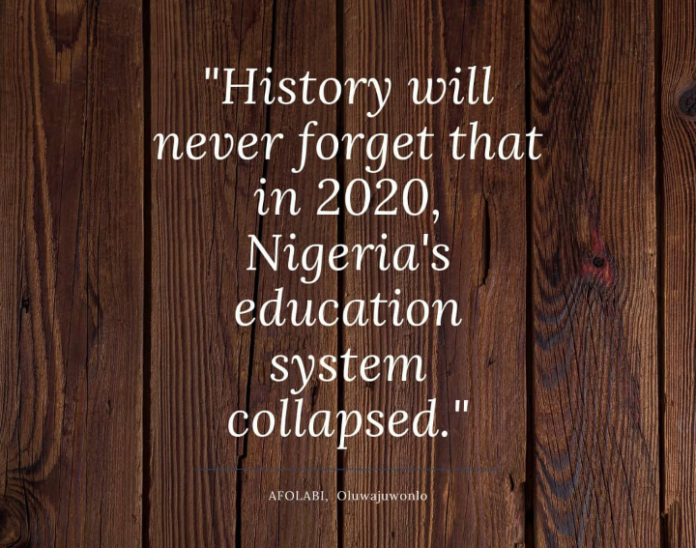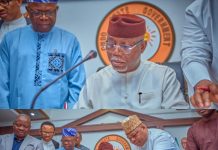
“We need to take advantage of technology like the case of other parts of the world. We cannot shut down all schools when we have other means to teach our students. We cannot be held down by COVID-19, we have to deploy all e-platforms to keep our universities, polytechnics, colleges of education and other schools open- We have to create virtual learning.”
These were the words of Nigeria Education Minister, Mallam Adamu Adamu in March, 2020 when he gave a directive mandating all institutions to switch to e-learning. One would think that the directive was not only timely but also the way to go. Five months after the directive, has Nigeria really taken advantage of technology for education, has Nigeria not really been held down by COVID-19, and has Nigeria created the virtual learning?
Looking closely into the Nigerian government’s efforts to prevent the education system from slipping to comatose due to the ongoing pandemic, can one really rate the efforts so far as Messiah’s deeds? On April 5, 2020, the Nigerian government through Federal Ministry of Education announced the launching of free e-learning portals for all students in primary and secondary schools after the closure of schools. Apart from the nationwide announcement, further activities have not shown the existential involvement of machineries or systems created to check and assess whether the created portals have been functional and serving their purposes or not. Can one say the free e-learning portals ended at announcement stage? A careful look into the situations of primary and secondary school students across the country shows that the portals are not only underutilized but also not serving the purposes for which they were created. Students’ enrollment, learning activities and engagement have been poor. Lack of digital devices, improper regulations of the system, poor information circulation, digital divide have all contributed to the ineffectiveness of the created e-learning portals.
The Federal Ministry of Education could give data on the registered number of users on the portals so far, active users and engagement statistics to prove this standpoint otherwise, if any.
The collapse of Nigeria’s education system as infiltrated by COVID-19 pandemic has not only hit hard on the students of primary and secondary schools in Nigeria, but has also plunged tertiary institutions into indefinite closure. FG in March 2020 gave a directive on school closure due to breakout of COVID-19 in the country. A total of 65 universities, 132 polytechnics, and 152 colleges of education have since then be shut down. Can this alone be described as the cause of the collapse? Of course not. After the closure, Academic Staff Union of Universities (ASUU) declared nationwide strike over IPPIS (Integrated Personnel and Payroll Information System), non-implementation of agreement, and poor condition of universities in Nigeria. Since March till this moment, the Union is still on with the industrial strike action. Can ASUU be entirely blamed for this further collapse of the system as caused by indefinite strike? Of course, no. Time and records have shown that the only industrial action recognized by the Nigerian government is strike action. However, one should be concerned to ask for the roles that this Union has played in rescuing the country’s education system from total collapse as the pandemic ravages. Has ASUU really done anything?
In June 2020, the Minister for Education, Mallam Adamu Adamu, had a meeting with the Vice Chancellors, Provosts, and Rectors of Nigerian tertiary institutions. He urged all institutions to switch to electronic learning. This could be said to correlate with his earlier directive on the said subject. However, ASUU in a document titled “The Directive by the Minister of Education That Tertiary Institutions Should Resume the Session Through Online Teaching” issued by the University of Ibadan (UI) Publicity Committee, insisted that virtual learning was impossible in Nigeria’s institutions. Just like that? A personal interaction I had with the Vice Chancellor of University of Ibadan, Prof. Abel Idowu Olayinka in June 2020 confirmed the ASUU’s standpoint on the supposed impossibility to use e-learning in Nigeria. The VC asked if I had a laptop. I answered “no.” He asked for how many students had laptops in my class. I said about 25 out of 198. He later said e-learning was not possible at the moment. That the lack of devices, structures, on-going strike actions and government’s non-readiness all culminated to the impossibility.
Read more: Nigeria Higher Education Foundation At 15: The Nigerian Story, My Testimony By Oluwajuwonlo Afolabi
For over five months, education system has been on a stoppage. The e-learning has only been at announcement stage. No structure is in place to make sure that millions of Nigerian students access quality education. This goes to expose the sad reality of education in Nigeria. I learnt in a course I had in drama techniques that even if you don’t have the required materials to carry out a solution, you can always improvise. FG and ASUU never improvised. Obviously, they are eagerly waiting for the perfect time which may never come. Only few private institutions in Nigeria keyed on the new normal and switched to e-learning for academic activities: teaching-learning, examinations and convocation. Even though there were reportedly cases of technical complexities. Those complexities were addressed and turned around to salvage the learning process. That technical advancement to adequately use e-learning couldn’t have come if they had decided to stay put and wait for the return to physical learning.
As ASUU goes about struggling for IPPIS or non-IPPIS, one could only wonder why no model or structure to remedy this unsavoury condition of educational fall has not been presented. The government does not act as if concerned about the continuous paucity of education in the country. One could only stay amazed that the government, academic and non-academic unions, legion of academia and even students are comfortable with the collapse of education system in Nigeria. History will never forget!
While Nigeria (Africa) remains on educational lockdown, Europe has moved on with online learning via, (The School of Future, Today), Australasia with 80% of households with internet has moved on with e-learning, America has moved on with e-learning. Benjamin Franklin says, “An investment in knowledge, yields the best interest.” While other countries invest in education and are mindful of getting best interests, the Nigeria’s case is not so. In Nigeria’s context, the point is not about bounty or no bounty interest. The point is, can Nigeria expect any interest from education? The sudden collapse and on-going comatose of Nigerian education system makes one think otherwise. Nevertheless, history will never forget that in 2020, Nigeria’s education system collapsed.















